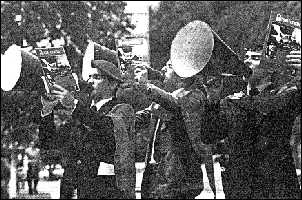| T.F.P. is accused of being
a "brainwashing cult"
by Miguel Martinez T.F.P. first met with considerable problems
in France, where the organization set up the "Ecole Saint-Benoît"
in 1977, a private school at Châteauroux, attended exclusively by
the children of Catholic traditionalists, and run by a group of TFP militants.
TFP first tried to explain away unexpected changes in the behaviour of
several students by calling them "individual cases". In a meeting in 1979,
the parents, the chaplain and the teachers all discovered that such cases
were anything but individual, and asked TFP to cease running the school.
The parents, teachers and chaplain, together
with several students, drew up a fascinating booklet on the organization
and its methods (reprinted by Catholic traditionalists as Tradizione
Famiglia Proprietà: associazione cattolica o setta millenarista?).
As with many similar groups, they discovered
that TFP gradually teaches its militants not to think: "You think too much:
this is a temptation from the devil", is the expression a Brazilian director
used speaking to a doubting Frenchman; typically, "over-thinking" is blamed
ideologically on René Descartes.
Secrecy, environmental control, constant
trips to Brazil are a feature of the indoctrination practised by the organization.
In the loaded jargon of the group, T.F.P.
militants are taught to speak of their parents as "F.M.R.", Fontes minha
revolução, the "sources of my revolution"; however parents
can atone for their revolutionary tendencies by financing the movement.
The decisive year for understanding Alleanza
Cattolica (and Introvigne's) switch-over from attacks on the "Jehovaist
cult" to equally fierce attacks on the "anti-cult movement" is 1985.
TFP was outlawed in Venezuela in 1984.
What interests us are not the facts in themselves, but the way T.F.P. viewed
them. The immediate (and rather unlikely) reason was that the organization
was supposedly plotting to assassinate the Pope. This happened shortly
after a former TFP member (but certainly a loner) had tried to kill the
Pope at Fatima in Portugal.
However, in a typical scenario, many worried
parents of TFP members got involved in the issue, and TFP was mainly accused
of "being a cult".
The episode is described in Bollettino
delle 15 TFP, Year I, n. 5, certainly around mid-1985.
The title is significant: "Socialist rage
strikes TFP-Resistencia".
As usual in such cases, the whole episode
is blamed, not on the Asociación Civil Resistencia, the local
T.F.P. organization, but on the government: supposedly, it was T.F.P.'s
campaign against a socialist law passed by the ruling party which called
the revenge of the government on the group. Also typically, we do not hear
what the government's accusations against T.F.P. were, but only the defence
of T.F.P. against a "series of persecutions", "a violent persecution" and
a "the most compact and total propaganda campaign imaginable". What is
of especial interest is:
The document of the Parliament Committee
calling for outlawing TFP said:
|



